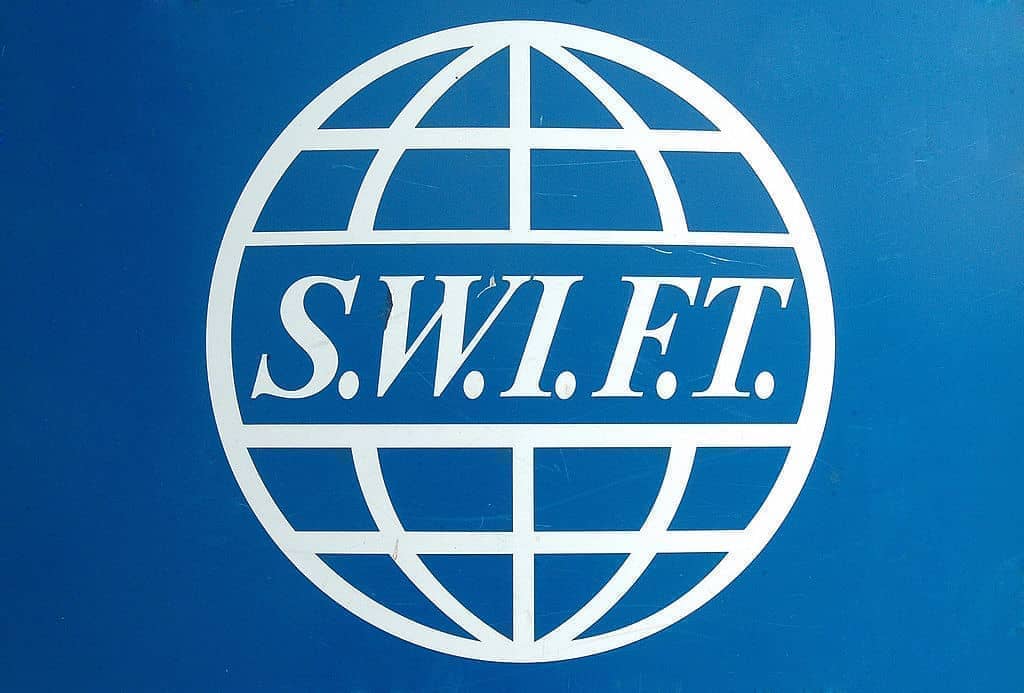‘The Russian invasion marks a turning point,’ said Olaf Scholz on Saturday as he announced that Germany would break its long-standing principle of not sending arms into conflict zones by delivering 1,000 anti-tank weapons and 500 Stinger missiles to Ukraine. ‘It is our duty to support Ukraine to the best of our ability,’ he explained.
With the halting of Nord Stream 2 and the offer of weapons, Berlin had already moved remarkably far out of its foreign policy comfort zone. Now it has gone a step further and agreed to exclude ‘selected Russian banks’ from the global payments system, Swift. It is not yet clear which banks will be targeted, which may affect the effectiveness of the sanctions.
Russia’s exclusion from Swift has been discussed for some time. The banking system acts as the world’s main financial artery, connecting 11,000 financial institutions in 200 countries. Cutting Russia out of the loop will hamper cash flow in and out of the country, limiting Putin’s ability to finance a drawn-out conflict in eastern Europe.
If Putin decides that the West has shied away, then there is no real deterrent to moving further than Ukraine
Many countries have argued for this drastic move, which has often been described as the ‘nuclear option’ of economic sanctions, and for good reason. In 2020, Russia’s exports were worth $332 billion and its imports $240 billion. Excluding Russia from Swift makes these transfers much more difficult. Chancellor Scholz had said repeatedly that he felt this severe option ‘must be reserved for a situation when it becomes necessary to step up things.’
This was not an easy decision for the German government to make. Germany is still dependent on Russian energy, with the country continuing to import over half of its gas and over 40 per cent of its oil from Russia. If Germany can no longer pay its energy bills through Swift, Russian companies are unlikely to carry on delivering. (Germany took the important step of halting the accreditation of Nord Stream 2, but the pipeline had not begun to operate, so the move has not made an immediate difference to German dependency.)
Germany’s exports to Russia also grew by 15.4 per cent last year – made up mainly of machinery, cars and chemicals – making Russia the country’s fifth most important export destination. Many smaller companies in Germany depend on this trade and will struggle if that cash flow is impeded.
A continuous source of resistance to harsher sanctions has come from the stubborn camp of Putin apologists in Berlin. Rolf Mützenich, chairman of the Social Democratic Party’s parliamentary group, for example, does not see closer cooperation within Nato as the answer to the crisis. That, he said, would require working with the US where ‘a return of Donald Trump or something similar cannot be entirely ruled out.’ Meanwhile, Ukraine’s ambassador in Berlin, Andriy Melnyk, was reportedly told by a German minister that ‘Ukrainians have only a few hours left. There is no point in helping you now.’
Russia’s exclusion from Swift could also have unintended side effects. Moscow knew it was on the table, not least because the idea had already been floated after the invasion of Crimea in 2014. Moscow has therefore built an alternative financial network called the System for Transfer of Financial Messages (SPFS). This already covers 400 financial institutions and around one fifth of Russia’s international transactions. It is also connected with China’s international banking system, the Cross-Border Interbank Payment System (CIPS). These systems may not rival Swift just yet, but they will likely mitigate the impact of exclusion and now receive further investment.
Despite the economic, political and diplomatic consequences, it is important that Germany has agreed to at least a partial exclusion of Russia from Swift. Right now, the impact of individual sanctions is almost beside the point. The West must do everything in its power to convince Putin, his inner circle and the wider Russian population that it means business. The scales need to tip against further Russian incursions into European territory. Everything added to the existing sanctions will help do that.
If, on the other hand, Putin decides that the West has shied away from severe economic consequences, he will conclude that the same applies to a military response. And if that happens, then there is no real deterrent to him moving further than Ukraine. Putin may try his luck in Nato territory in an effort to rebuild a sphere of influence in eastern Europe.
The value of the Swift exclusion lies not least in its psychological impact. For geopolitical reasons alone, Germany is a key player in this conflict, and it has just come much closer to showing that it is prepared to defend Europe. As the adage goes: ‘if you want peace, prepare for war.’ That applies to all battlefields, including economic ones. Collectively, the West must convince Putin that we will do what it takes, even if it comes at a high cost.







Comments